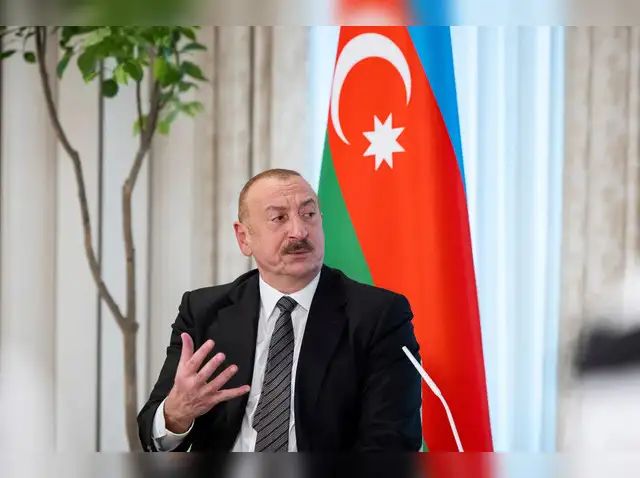 Image Source: Economic Times
Image Source: Economic Times
Aliyev Praises Move as Strategic Breakthrough in U.S.-Azerbaijan Relations
In a landmark shift in U.S. foreign policy, President Donald Trump has officially lifted longstanding restrictions on defense cooperation with Azerbaijan, signaling a new era of strategic alignment between Washington and Baku. The announcement was made during a high-profile peace summit at the White House, where Trump hosted Azerbaijani President Ilham Aliyev and Armenian Prime Minister Nikol Pashinyan to finalize a trilateral peace agreement aimed at ending decades of conflict in the South Caucasus.
Key Developments from the White House Summit
President Trump announced the removal of defense cooperation restrictions with Azerbaijan, previously enforced under Section 907 of the Freedom Support Act of 1992.
Azerbaijani President Ilham Aliyev expressed gratitude to Trump, calling the move a “strategic breakthrough” and praising the U.S. for its renewed commitment to regional stability.
The announcement coincided with the signing of a peace declaration between Armenia and Azerbaijan, brokered by the U.S., and the launch of the Trump Route for International Peace and Prosperity (TRIPP).
Background: Why the Restrictions Existed
The Freedom Support Act of 1992 prohibited direct U.S. assistance to the Azerbaijani government due to its conflict with Armenia over Nagorno-Karabakh. While waivers were occasionally issued—especially post-9/11—the Biden administration had paused them amid concerns over Azerbaijan’s military posture.
Trump’s decision to lift the restrictions marks a significant departure from previous administrations, reflecting a broader realignment of U.S. strategic interests in the South Caucasus.
Strategic Implications of the Defense Shift
Military Cooperation and Security Ties The lifting of restrictions opens the door for expanded military collaboration, including joint training, intelligence sharing, and potential arms deals. Azerbaijan had previously received over $100 million in U.S. military aid under waiver provisions.
Regional Power Dynamics The move is expected to weaken Russian and Iranian influence in the region. With the U.S. now actively involved in defense and infrastructure development, Azerbaijan gains a powerful ally in its efforts to modernize its military and secure its borders.
Economic and Infrastructure Synergy Defense cooperation is part of a broader package that includes economic agreements, energy partnerships, and the development of the TRIPP corridor—a 27-mile transit route connecting mainland Azerbaijan to its Nakhchivan exclave through Armenian territory.
Aliyev’s Response and Diplomatic Messaging
President Aliyev publicly thanked Trump for his leadership, stating that Azerbaijan is “very pleased” with the U.S. administration’s proactive role in resolving regional tensions. Speaking at the Shusha Global Media Forum earlier this month, Aliyev emphasized that Trump’s engagement in the South Caucasus reflects a deeper commitment to global peace and prosperity.
Aliyev also noted that the defense partnership would enhance Azerbaijan’s ability to contribute to regional security and economic development, particularly as the country positions itself as a key transit hub between Europe and Asia.
Reactions and Concerns
Supporters view the move as a pragmatic step toward stabilizing the region and countering malign influence from Russia and Iran.
Critics, including Armenian advocacy groups, argue that lifting restrictions rewards Azerbaijan’s aggressive actions in Nagorno-Karabakh and undermines accountability for human rights violations.
Regional analysts caution that while the peace deal and defense cooperation are promising, unresolved issues—such as displaced populations and border demarcation—could still pose risks to long-term stability.
What Comes Next
The U.S. is expected to finalize bilateral defense agreements with Azerbaijan in the coming weeks, outlining the scope of cooperation and safeguards.
Joint infrastructure projects under the TRIPP initiative will begin development, with American companies leading construction and management.
Armenia and Azerbaijan will formally exit the OSCE Minsk Group, signaling a shift away from traditional multilateral mediation frameworks.
Conclusion
President Trump’s decision to lift defense restrictions on Azerbaijan marks a pivotal moment in U.S. foreign policy and South Caucasus diplomacy. With new military and economic ties forming, the region may be entering a phase of unprecedented cooperation—though challenges remain. As Aliyev and Trump celebrate this breakthrough, the world watches to see whether peace and prosperity can truly take root in a region long defined by conflict.
Sources: Axios, Politico, Devdiscourse, Report.az
Advertisement
Advertisement




